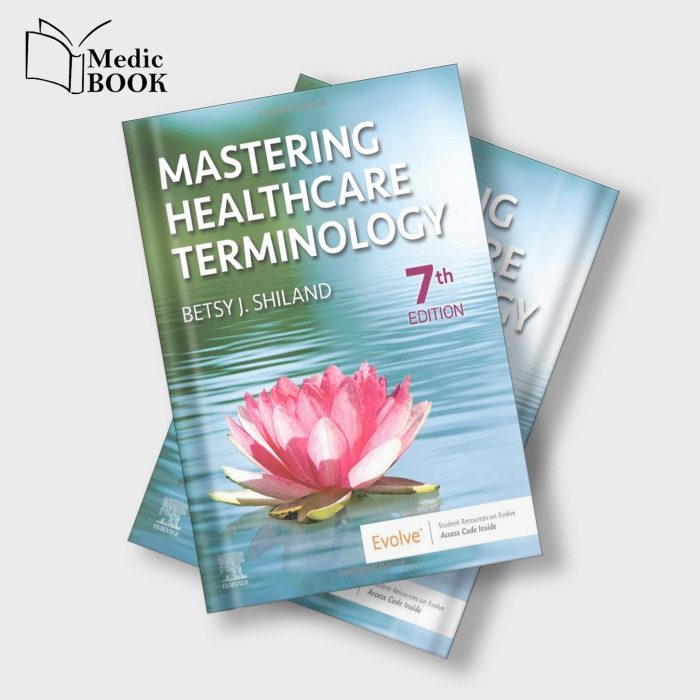Mastering healthcare terminology 6th edition – Mastering Healthcare Terminology, 6th Edition, sets the stage for an immersive exploration of the complexities and nuances of medical language. This comprehensive guide empowers healthcare professionals with the essential knowledge and skills to navigate the intricate web of medical terminology, ensuring accurate communication, efficient documentation, and enhanced patient safety.
Delving into the core principles of medical terminology, the book unravels the intricate tapestry of word roots, prefixes, suffixes, and combining forms, providing a solid foundation for understanding and deciphering complex medical terms. Through a systematic organization and user-friendly structure, Mastering Healthcare Terminology, 6th Edition, guides readers through the major body systems, diagnostic and therapeutic procedures, pharmacology, medical abbreviations, and acronyms, offering a comprehensive overview of the healthcare lexicon.
Introduction: Mastering Healthcare Terminology 6th Edition
Healthcare terminology plays a vital role in communication and documentation within the healthcare industry. Mastering healthcare terminology enhances patient safety, improves efficiency, and facilitates accurate and consistent medical record keeping.
Key Features of Mastering Healthcare Terminology, 6th Edition
The 6th edition of Mastering Healthcare Terminology offers updated content and features, including:
- New terms and revised definitions
- Expanded coverage of emerging healthcare trends
- Organization into chapters, sections, and appendices for ease of navigation
Understanding Medical Terminology
Medical terminology follows principles of word roots, prefixes, suffixes, and combining forms. These elements combine to form medical terms that describe anatomical structures, physiological processes, and medical procedures.
Major Body Systems
| System Name | Organs | Functions | Related Terms |
|---|---|---|---|
| Cardiovascular System | Heart, blood vessels | Pump and circulate blood | Artery, vein, capillary |
| Respiratory System | Lungs, airways | Gas exchange | Bronchus, alveolus, diaphragm |
| Digestive System | Mouth, stomach, intestines | Process and absorb nutrients | Esophagus, liver, pancreas |
| Musculoskeletal System | Bones, muscles, joints | Support, movement, protection | Femur, ligament, tendon |
Diagnostic and Therapeutic Procedures
- Echocardiogram:Ultrasound of the heart to assess its structure and function
- Electrocardiogram (ECG):Records the electrical activity of the heart
- Magnetic Resonance Imaging (MRI):Uses magnetic fields and radio waves to create detailed images of the body
Pharmacology

Pharmacology involves the study of drugs, their mechanisms of action, and adverse effects. Common drug classes include:
| Drug Class | Uses | Dosages |
|---|---|---|
| Antibiotics | Treat bacterial infections | Varies depending on the antibiotic |
| Analgesics | Relieve pain | Varies depending on the analgesic |
| Antidepressants | Treat depression | Varies depending on the antidepressant |
Medical Abbreviations and Acronyms
- CBC:Complete blood count
- BP:Blood pressure
- ECG:Electrocardiogram
- ICU:Intensive care unit
Case Studies and Exercises
Case studies and exercises reinforce learning by applying medical terminology in real-world scenarios. They illustrate the use of terminology in patient charts, medical reports, and other healthcare documents.
FAQ Overview
What are the key features of Mastering Healthcare Terminology, 6th Edition?
Mastering Healthcare Terminology, 6th Edition, boasts updated content, revised definitions, and expanded coverage of emerging healthcare trends. Its user-friendly organization and comprehensive structure, including chapters, sections, and appendices, facilitate easy navigation and understanding.
How does Mastering Healthcare Terminology, 6th Edition, enhance patient safety?
By providing a thorough understanding of medical terminology, this guide empowers healthcare professionals to communicate accurately and document precisely, reducing the risk of misinterpretations and errors. This, in turn, contributes to enhanced patient safety and improved healthcare outcomes.
What are the benefits of using case studies and exercises in Mastering Healthcare Terminology, 6th Edition?
Case studies and exercises offer practical applications of medical terminology, reinforcing learning and fostering critical thinking skills. They allow readers to apply their knowledge to real-world scenarios, enhancing their ability to effectively communicate and document in the healthcare setting.